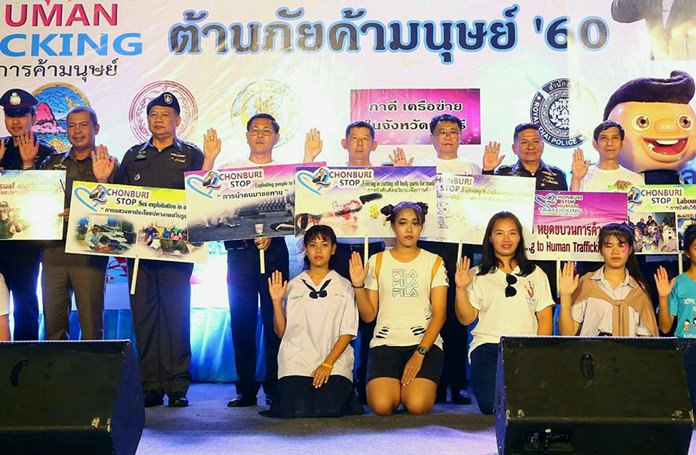
Chonburi and Pattaya marked Anti-Trafficking Day with a parade touting Thailand’s “tough” laws, even as the U.S. criticized the country for a lack of progress in the past year.
Mayor Anan Charoenchasri led the July 15 procession that began on Pattaya Beach at Central Road. He welcomed Apichart Apichartbooth, inspector-general from the Ministry of Social Development and Human Security and representatives from Chonburi Province.
The group marched to the Siam Bayshore Resort & Spa at the far end of Walking Street where youth-band champions played and participants handed out brochures about human trafficking problems.
Public officials touted Thailand’s laws against human trafficking and penalties for violating them, which range from prison terms of 4-10 years and fines of 80,000-200,000 baht. In cases of trafficking children, punishments range from jail sentences of 6-15 years and fines of 120,000-300,000 baht.
While officials called those laws “tough”, world opinion continues to castigate Thailand for lagging badly in efforts to eradicate labor and sex trafficking.
The influential “Trafficking in Persons” report by the U.S. State Department released in June skewered the kingdom for making no progress since last year’s report, keeping it firmly locked on the Tier 2 Watch List.
The report stated “the government of Thailand does not fully meet the minimum standards for the elimination of trafficking; however, it is making significant efforts to do so”.
Thailand’s failures were delineated in embarrassing fashion for the government. The regime:
* did not demonstrate increasing efforts compared with the previous reporting period;
* did not aggressively prosecute and convict officials complicit in trafficking crimes;
* identified fewer victims compared with the previous reporting period;
* conducted a low number of labor-trafficking investigations compared with the scale of the problem;
* increased the number of inspection centers at fishing ports but identified relatively few victims and conducted few criminal investigations; and
* allowed officials involved in trafficking to impede anti-trafficking efforts.
Parade participants were encouraged to keep a watch out for traffickers and victims and report them to authorities immediately.




